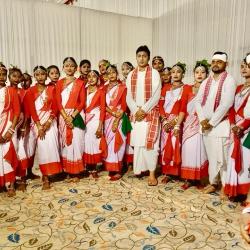The Deepor Beel wetland, situated in the western precincts of Guwahati city, Assam, is an internationally important wetland designated under the Ramsar Convention. It is a habitat for many rare and endangered species of flora and fauna and provides essential ecosystem services such as water purification, flood control, and carbon sequestration. However, the rapid urbanization and pressure of human activity in the surrounding areas have put the wetland at risk. To ensure the preservation and sustainable management of the wetland, an integrated approach involving local communities is required.
On April 12, 2023, Aaranyak, a leading research-oriented biodiversity conservation non-profit, organized a consultation workshop on ‘The role of community in conservation and sustainable management of the Deepor beel’. The event aimed to reconnect with the local people and discuss ways to preserve and co-manage the wetland sustainably in partnership with government agencies and civil society.
The consultation was held in collaboration with Paschim Guwahati Mahavidyalaya (PGM), Dharapur, Kamrup Metropolitan District, and several resource persons addressed the audience, including Dr. Rana Sarmah, Principal of PGM, Dr. Sudip Kanta Basistha from GIZ-India, Dr. Bibhuti Prasad Lahkar, Senior Scientist from Aaranyak, Sri Rituraj Dewan from Simang Collectives Pvt Ltd., Dr. Bidyut Bikash Sharma from the Department of Environmental Science at Gauhati University, and Dr. Marie Kalita, Faculty in English Department, PGM.
Community representatives, Umed Ali Ahmed of Dharapur and Mukul Das of Matia, provided valuable insights into the intricate socio-ecological issues affecting the wetland. They highlighted the importance of Deepor Beel for the lives and livelihoods of the people and the environmental security and sustainability of Guwahati city.
The event concluded with the message that an integrated management approach involving the government, local people, and civil society is essential for the protection of Deepor Beel and the improvement of the livelihood situation of the riparian people. It was instituted as part of an ongoing study on ‘Assessment of the socioeconomic and livelihood conditions of the communities living on the banks of the Deepor Beel’ by Aaranyak in collaboration with GIZ-India and the Assam Forest Department.
Deepor Beel, which was once a pristine wetland, is now almost an 'urban wetland' surrounded by what can be called 'urban villages'. The urbanization and allied pressures have emerged as threats to the existence of the wetland. To prevent the degradation of the wetland, the role of the local communities is crucial. The communities living in and around the wetland must be included in decision-making processes and the implementation of conservation measures.
The consultation workshop provided a platform for local communities, researchers, and policymakers to exchange ideas, knowledge and discuss potential solutions. The workshop emphasized the importance of preserving the wetland and the need for a comprehensive approach to management and conservation. It highlighted the importance of the wetland for the surrounding communities, especially in terms of their livelihoods.
The workshop was a significant step towards developing a collaborative approach to conservation, involving all stakeholders, and it is hoped that such initiatives will continue to raise awareness and mobilize efforts towards the protection and preservation of Deepor Beel. It is essential to remember that conserving natural resources is not just the responsibility of the government or civil society, but it is also the responsibility of local communities who depend on these resources for their livelihoods.
- 23377 reads









Add new comment